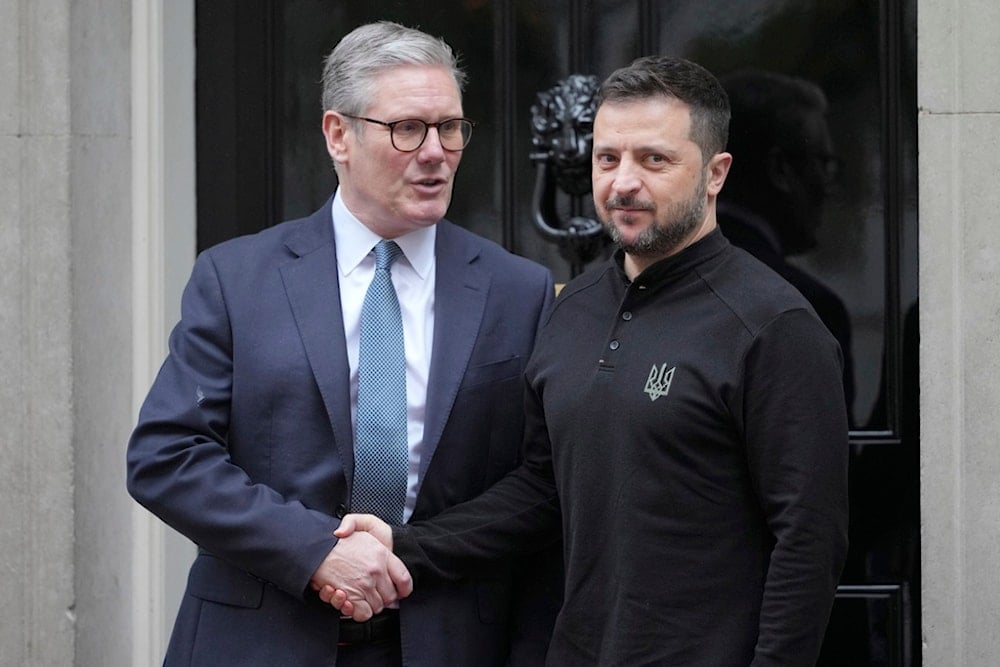UK's Storm Shadow approval risks backlash amid shifting US leadership
Anatol Lieven's analysis in Responsible StatecrafT warns that the UK's decision to enable Ukrainian missile strikes on Russia risks provoking retaliation.
-

Britain's Prime Minister Keir Starmer welcomes Ukrainian President Volodymyr Zelenskyy to 10 Downing Street in London, Thursday, Oct. 10, 2024. (AP)
An analysis published by writer Anatol Lieven for Responsible Statecraft detailed the escalating risks posed by the UK's decision to allow Ukraine to use British Storm Shadow missiles for strikes inside Russian territory.
The move, which follows the Biden administration's approval of Ukraine's use of long-range ATACMS missiles, reflects a broader Western strategy to bolster Ukraine's position before potential peace negotiations.
However, Lieven's analysis raises significant concerns about the long-term consequences of these actions for the UK, Europe, and their relationship with a potentially Trump-led US administration.
Lieven argues that such decisions may not only provoke Russia but also alienate future US leadership, especially if Donald Trump returns to office in January. Trump, who has hinted at pursuing a peace agenda in Ukraine, could perceive these moves as deliberate attempts to sabotage his plans.
The analysis warns that this could place the UK in a precarious position, both diplomatically and in terms of national security should Russia retaliate specifically against the UK to avoid directly targeting US interests.
Read more: Russia reportedly captures British soldier fighting for Ukraine
The article further critiques Europe's ability to sustain its commitments to Ukraine, highlighting economic strains, political instability, and inadequate military capabilities across the continent.
Lieven describes current European and British strategies as overly reliant on US leadership and disconnected from their own national interests, likening their policymaking to "running around in circles" in the face of geopolitical realities.
The piece concludes by calling for a more calculated and restrained approach, warning that the pursuit of short-term gains could leave the UK and Europe dangerously exposed in a rapidly shifting global landscape.
Russia's nuclear doctrine update
On Sunday, Kremlin spokesperson Dmitry Peskov told Russian journalist Pavel Zarubin that President Vladimir Putin's decree updating Russia's nuclear doctrine should be viewed as a message to the West and not as a mere coincidence.
“Surely, there cannot be any coincidences here. There is certain consistency,” Peskov said when asked about the doctrine update, adding that Russia is ready to respond to unprecedented escalation incited by the West.
“Although President Putin assigned to prepare the amendments in order to adapt our [nuclear] doctrine to the conditions of the current confrontation, which is incited by the Western states, Putin has to respond to the unprecedented escalation which is primarily spurred by the outgoing administration in Washington,” Peskov said.
The spokesperson added that the US is taking increasingly reckless actions to escalate the conflict in Ukraine.
Regarding the Oreshnik missile test-fire this week, Peskov said, "Apparently, a very narrow circle [of people knew about it]."
Peskov admitted he was unaware of the test and noted that, given the current geopolitical situation, the development of new weapons is a highly classified process.
Read more: UN chief slams landmine threat after US announces Ukraine supply

 3 Min Read
3 Min Read









